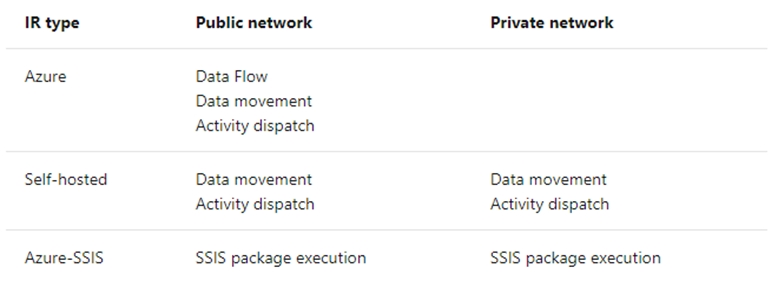Which Type of Integration Runtime to Use for Copying Blob Data to Data Warehouse in Azure Synapse Analytics | SEO for DP-200 Exam | Microsoft
Question
You have an Azure Storage account and a data warehouse in Azure Synapse Analytics in the UK South region.
You need to copy blob data from the storage account to the data warehouse by using Azure Data Factory.
The solution must meet the following requirements:
-> Ensure that the data remains in the UK South region at all times.
-> Minimize administrative effort.
Which type of integration runtime should you use?
Answers
Explanations
Click on the arrows to vote for the correct answer
A. B. C.A

Incorrect Answers:
B: Self-hosted integration runtime is to be used On-premises.
https://docs.microsoft.com/en-us/azure/data-factory/concepts-integration-runtimeIn this scenario, you need to copy blob data from an Azure Storage account to an Azure Synapse Analytics data warehouse in the UK South region using Azure Data Factory. To meet the requirements of ensuring that the data remains in the UK South region at all times and minimizing administrative effort, you should use an Azure integration runtime.
An integration runtime is a compute infrastructure that Azure Data Factory uses to provide data integration capabilities across different network environments. There are three types of integration runtimes: Azure integration runtime, self-hosted integration runtime, and Azure-SSIS integration runtime.
Azure integration runtime is a fully managed, cloud-based integration runtime that provides data integration capabilities within the Azure cloud. It does not require any additional infrastructure, and it is easy to set up and configure. Azure integration runtime provides connectivity to various data sources, including Azure Storage and Azure Synapse Analytics.
Self-hosted integration runtime is an on-premises runtime that enables you to move data between on-premises and cloud data stores. To use self-hosted integration runtime, you need to install and configure it on a local machine or a virtual machine in your on-premises network.
Azure-SSIS integration runtime is used to execute SQL Server Integration Services (SSIS) packages in Azure. It provides a fully managed environment to host SSIS packages in Azure, allowing you to migrate your existing SSIS packages to the cloud.
In this scenario, using the Azure integration runtime is the best option because it is a fully managed, cloud-based integration runtime that supports both Azure Storage and Azure Synapse Analytics. It allows you to meet the requirement of keeping the data in the UK South region, and it requires minimal administrative effort because it is a fully managed service.
